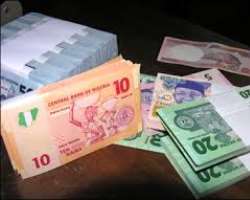Jonathan Has “Great Interest” In Controversial Audit Report On NNPC—Auditor General

The Auditor General of the Federation (AuGF), Samuel Ukura, on Tuesday blamed the inability of his office to publish the report of the forensic audit on the Nigerian National Petroleum Corporation (NNPC) over the missing $20 billion oil fund on presidential interest.
He said the the Goodluck Jonathan presidency had far more special interest in the matter than his own office and the auditors.
Several months after PriceWaterhouseCoopers Limited completed investigations into the allegation of unremitted oil revenues, the report was not released to the public despite demands by Nigerians.
On Sunday, April 27, President-elect, Muhammadu Buhari, had threatened that his administration would probe the allegations on assumption of office.
Apparently reacting to Mr. Buhari’s threat, President Goodluck Jonathan on Monday ordered immediate release of the report to Nigerians.
Presidential spokesperson, Reuben Abati, said the decision to release of the full report was to demonstrate that the present administration had nothing to hide over the matter.
But in a response to a Freedom of Information (FOI) request by PREMIUM TIMES, the AuGF blamed the long delay by his office in releasing the full audit report on the Presidency.
In response to this newspaper’s request for the document, days before the presidency released it, Mr. Ukura said he was not in a position to release the report because the presidency has “great interest” in the information contained therein.
“After a careful review of the information, it is my considered opinion that the Presidency has a great interest in the information,” the auditor general said through his representative, Uche Okafor-Agbi.
He therefore advised PREMIUM TIMES to redirect its request for the report to the presidency which had custody of the document.
“You may wish to channel your application accordingly,” Mr. Ukura said.
Mr. Ukura’s letter to PREMIUM TIMES was apparently dispatched hours before the presidency released the audit report but it arrived this newspaper’s office hours after the document had been made public.
Although the Constitution does not provide for the AuGF to submit audit reports to any arm of the executive, but to the National Assembly, Mr. Ukura, on February 5, presented highlights of the report, on the orders of the president.
Apparently deferring to the presidency, he failed to forward the report to the National Assembly as demanded by the Constitution.
The highlights had indicted the management of NNPC, demanding the refund of $1.48 billion by the Nigerian Petroleum Development Company, NNPC upstream subsidiary, for various unreconciled transactions.
In his letter to PREMIUM TIMES, the auditor-general said under the Federal Civil Service Rules, the audit report was carried out by PwC as an assurance engagement in which the reporting channel was duly spelt out in the international auditing standard.
Under the circumstance, he said neither his office nor the auditing firm had greater interest in releasing the information in accordance with the FOI Act 2011.
Meanwhile, PricewaterhouseCoopers, which curiously said it could not vouch for the integrity of its report, on Tuesday declined to explain why produced a document on which no one is expected to rely.
The firm’s spokesperson, Delia Asuzu, refused to comment, claiming confidentiality agreement between the company and its clients.
However, the Lead Director, Centre for Social Justice, Eze Onyekpere, has lauded the release of the report, describing it as a welcome development.
He said the audit would help uncover the truth about the missing funds expose, bring the culprit(s) to book and restore public confidence in the oil and gas industry.
Mr. Onyekpere expressed regrets that the release of the report did not come voluntarily, but compelled by the threat of the President-elect to order a new probe.
“For an administration that signed the Freedom of Information Bill into law deciding to hide such a document from the public speaks volumes of the administration’s commitment to transparency and accountability,” Mr. Onyekpere said.
He said what the oil sector needed, beyond the probe of missing $20billion, was the probe of the NNPC management since 1999, as the monies earned in the last 15 years did not match developments and expenditures Nigerians see.
Mr. Onyekpere called for fundamental restructuring of the industry to separate the regulator from being an active player, introduce private sector efficiency and allow investors to finance long term transactions and projects in the oil and gas industry.
